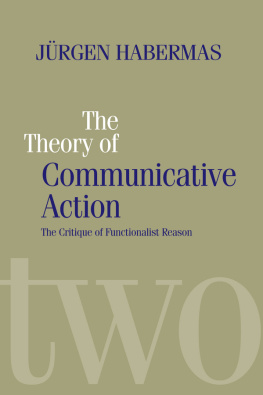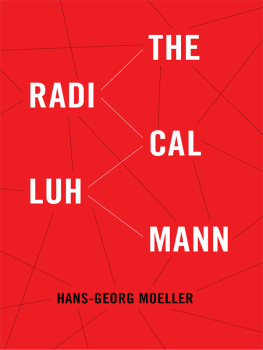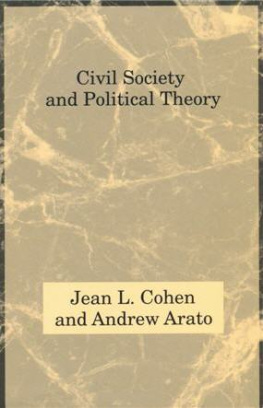Stanford University Press
Stanford, California
English translation 2013 by the Board of Trustees of the Leland Stanford Junior University. All rights reserved.
Theory of Society, Volume 2 was originally published in German under the title Gesellschaft der Gesellschaft. Band 2 Suhrkamp Verlag Frankfurt am Main 1997.
The translation of this work has been published with the assistance of the Volkswagen Foundation.
No part of this book may be reproduced or transmitted in any form or by any means, electronic or mechanical, including photocopying and recording, or in any information storage or retrieval system without the prior written permission of Stanford University Press.
Printed in the United States of America on acid-free, archival-quality paper
Library of Congress Cataloging-in-Publication Data
Luhmann, Niklas, 1927-1998, author.
[Gesellschaft der Gesellschaft. English]
Theory of society / Niklas Luhmann ; translated by Rhodes Barrett.
2 volumes cm.--(Cultural memory in the present)
Originally published in German under the title Die Gesellschaft der Gesellschaft.
Includes bibliographical references and index.
ISBN 978-0-8047-7159-7 (cloth : alk. paper)-
ISBN 978-0-8047-7160-3 (pbk. : alk. paper) (vol. 2)
1. Sociology. 2. Social systems. 3. Communication. I. Title. II. Series: Cultural memory in the present.
HM590.L84513 2012
301--dc23
2012021883
ISBN 978-0-8047-8727-7 (electronic)
Typeset by Bruce Lundquist in 11/13.5 Adobe Garamond
THEORY OF SOCIETY
VOLUME 2
Niklas Luhmann
Translated by Rhodes Barrett
STANFORD UNIVERSITY PRESS
STANFORD, CALIFORNIA
Cultural Memory in the Present
Mieke Bal and Hent de Vries, Editors
Contents
Differentiation
1. System Differentiation
Since its inception, sociology has been concerned with differentiation. outcome of processeswhether of evolutionary developments or (as in the case of politically united nations) of purposive action.
Toward the end of the nineteenth century, this concept of differentiation made it possible to switch from theories of progress to structural analysis, while nevertheless adopting the economists belief in the productiveness of the division of labor. Talcott Parsonss general theory of the action system still built on this concept, which offered a key formula both for analyzing development (increasing differentiation) and for explaining modern individualism as the result of role differentiation. It led Georg Simmel to analyze money, mile Durkheim to reflect on changes in the forms of moral solidarity, and Max Weber to develop his concept of the rationalization of different orders of life such as religion, the economy, politics, and eroticism. The dominance of the differentiation concept proves useful precisely because it does not exclude seemingly disparate theoretical approachesto development, to individuality, to value criteriabut rather gives access to them. In sum, differentiation is necessary to maintain cohesion under conditions of growth.
The differentiation concept enabled modern society to admire and criticize itself. It could regard itself as the irreversible outcome of history and look to the future with a great deal of skepticism. For Simmel as for Weber, highly developed form is a correlate of differentiation, as is the emergence of individuality for practically all the classical sociologists. At the same time, however, form is not to be had without a disturbing loss of meaning: it always involves restriction and renunciation; and individuality does not make the individual what he would like to be, but produces the experience of alienation. Together with individual particularity, awareness develops of what this particularity does not entail, generating, since the end of the nineteenth century, various theories of a plural self, of conflict between personal and social identity, or of contradictory socialization.
This overdetermination through connectivity options is, however, at the cost of conceptual clarity. of systems and can therefore be explained by system differentiation; and this is so because every operational (recursive) connection of operations generates a difference between system and environment.
If a social system emerges in this manner, I speak of it differentiating out [ausdifferenzieren] against what this process then makes into the environment. Such outdifferentiation can, as in the case of the societal system, take place in the unmarked space of meaningful possibilities (that can become open to marking only through differentiation), hence in the otherwise unlimited world. But it can also take place within already formed systems. This is the only case I shall call system differentiation, or, when considering the difference mentioned, internal differentiation of the system concerned.
System differentiation is thus nothing other than recursive system formation, the application of system formation to its own result. The system in which further systems arise is reconstructed by a further distinction between subsystem and environment. From the perspective of the subsystem, the rest of the comprehensive system is now environment. For the subsystem the overall system
It is important to understand this process with the necessary
The differentiation process can thus begin somewhere or other and somehow or other and reinforce the deviation that has village and that, as the environment of the village, modifies its possibilities.
In the context of system differentiation, every change is therefore a double, indeed, multiple, one. Every change to a subsystem is also a change to the environment of other subsystems. Whatever happens, happens in multiplicitydepending on the system reference.
Switching from the whole-part schema to that of system-environment in analyzing society facilitates the coordination of systems theory and evolution theory. and it leaves completely open how many such possibilities there are, and whether and in what form they can be coordinated.
In many other regards, too, systems theory offers a greater wealth of logical structure than the tradition of thinking in wholes and parts. It can (and must), for example, distinguish between system-environment relations and system-system relations (tradition knows only the
In the system-system relations permitted by a societal order of differentiation, only such structural couplings can exist that do not cancel out the autopoiesis of subsystems. This is true, for example, of relations between villagers in segmentary societies, and for relations between castes or estates of birth [Geburtsstnde] in hierarchical orders, and, in much more complex and complicated forms, also of relations between the functional systems of modern society. What functions as structural coupling in relations between subsystems is, however, also a structure of the comprehensive system of society. This justifies describing societal systems above all in terms of their form of differentiation, for this is the form of structure formation that determines and limits what structural couplings between subsystems are possible.
Finally, switching from the whole-part schema to the system-environment schema changes the value of the integration concept. In old European thinking, there was no special term for this, for integration of the parts was presupposed in the wholeness of the whole as ordinata concordia [well-ordered concord], and expressed with regard to single phenomena as their nature or essence. the contrary).
However, a normative concept that promotes or at least approves of integration must face growing opposition in societies that are becoming more complex. Retaining such a concept imposes paradoxical or tautological, self-implicative formulations. finally leads to rejection of the society in which one lives. What then?
Next page







